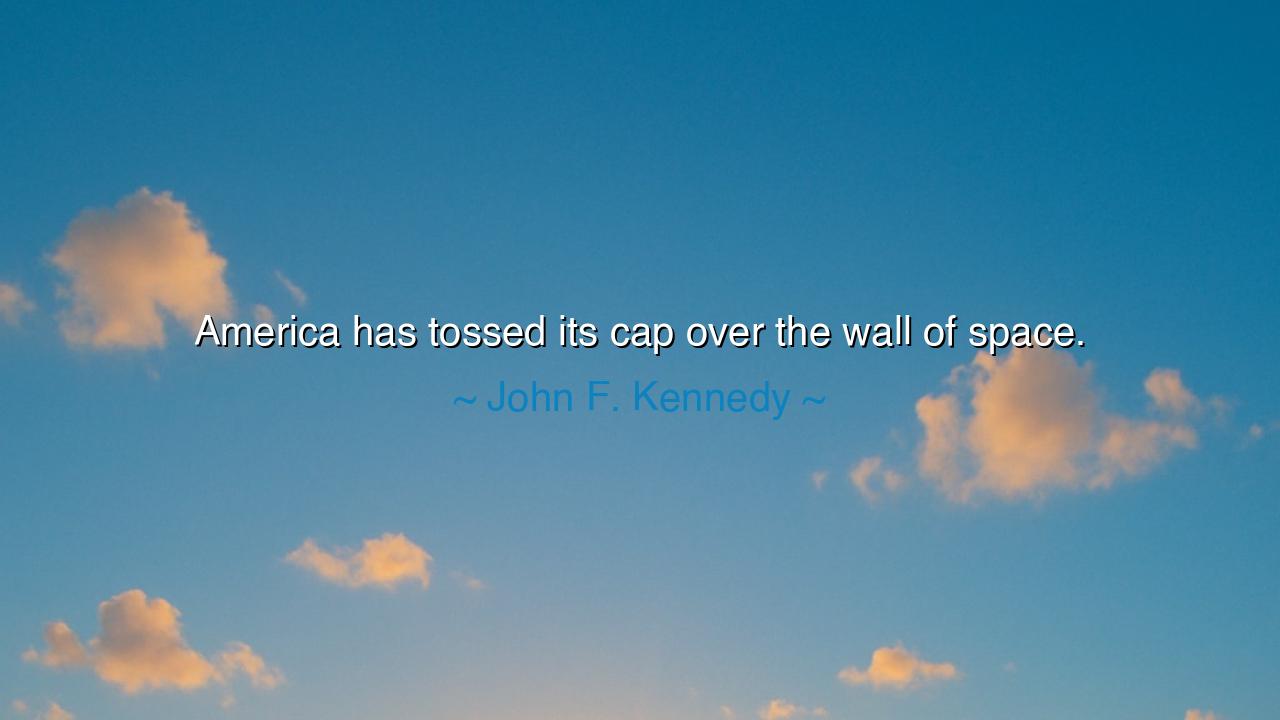
America has tossed its cap over the wall of space.






"America has tossed its cap over the wall of space." — these words, spoken by John F. Kennedy, embody the spirit of boldness, determination, and the courage to pursue the impossible. To toss one's cap over a wall is an ancient metaphor, symbolizing the act of committing to a goal without a clear or easy path to its achievement. Once the cap is thrown over the wall, one must follow, for the cap cannot remain on the other side of the wall without action. In this case, Kennedy’s declaration that America had tossed its cap over the wall of space was a bold, public commitment to a new frontier, one that would require not only vision and resources, but also sacrifice and resolve. By sending a man to the moon, America was making a statement to the world: it was willing to take on a challenge far beyond the reach of common sense, a challenge that would define the era and push the very boundaries of human capability.
In the ancient world, there were those who, like Odysseus, sought to venture beyond the limits of the known world. Odysseus, in his journey home from Troy, faced myths, monsters, and storms that tested his courage and wisdom. Yet, it was his unwavering resolve to return home that drove him forward, no matter the obstacles. Kennedy’s words echoed this kind of heroic resolve, urging the American people and the world to undertake a journey that would require all their resources and ingenuity. Just as the great heroes of myth were driven by honor and the pursuit of glory, so too was America’s mission to space driven by the need to explore and conquer the unknown.
The decision to toss America’s cap over the wall of space was no mere political gesture; it was a pledge to the future of mankind. The space race, in the context of the Cold War, was a competition not only between two superpowers but between two ideologies—democracy and communism. The goal of sending a man to the moon was not merely scientific; it was a statement of freedom and progress, a demonstration that the human spirit is capable of greatness when united by a common purpose. Just as the ancient Greeks celebrated the achievement of Hercules, whose feats of strength were legendary, so too would humanity celebrate this conquest of the heavens.
Consider the story of Christopher Columbus, whose journey across the uncharted Atlantic was met with doubt and scorn. Columbus, like Kennedy, tossed his cap over the wall of the known world, committing himself and his crew to an unknown future, driven by the belief that the world was not as small as it appeared. His journey, though fraught with danger, would eventually lead to the discovery of new lands and a new chapter in human history. His bravery and vision changed the course of the world forever. Similarly, Kennedy’s commitment to space exploration was a declaration of human potential, a call to risk and discovery in the face of an unknown and daunting challenge.
Kennedy’s vision of space exploration was a call to action, but it was also a reminder of the costs that would accompany such lofty ambitions. The Apollo program, which sought to land a man on the moon, would not be achieved without significant sacrifice. It would require the dedication of thousands of engineers, scientists, and astronauts, each contributing to a grand endeavor that demanded unwavering commitment. As with any noble pursuit, the quest to toss the cap over the wall of space was a challenge to the human spirit, testing our resolve, our dedication, and our willingness to risk failure in the pursuit of a goal that would ultimately benefit all of humanity.
The lesson in Kennedy’s words is one of courage and vision. To toss one’s cap over the wall is to commit to an endeavor that may seem impossible or impractical but is ultimately necessary for progress. In our own lives, we are often faced with opportunities to take bold actions—whether in our careers, our personal lives, or our communities—that challenge the status quo. These moments require us to embrace the unknown, to trust in our own potential, and to step forward, even when the path ahead is unclear. Kennedy’s challenge to explore the unknown is a call to each of us to take our own journeys, to set audacious goals, and to pursue them with the courage and determination of a hero.
In our own age, let us not wait for the easy or familiar to guide us. Kennedy’s words remind us that greatness lies not in the comfort of the known, but in the courage to face the unknown. Whether we are pursuing knowledge, innovation, or personal growth, we must be willing to toss our cap over the wall, to commit ourselves to the journey, and to rise to the challenge of forging a future that is better, bolder, and more inclusive for all. Let us carry that same spirit of discovery with us as we explore the uncharted territories of our own lives, knowing that the greatest rewards often come to those who dare to venture beyond the known.






AAdministratorAdministrator
Welcome, honored guests. Please leave a comment, we will respond soon